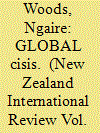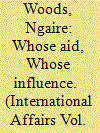|
|
|
Sort Order |
|
|
|
Items / Page
|
|
|
|
|
|
|
| Srl | Item |
| 1 |
ID:
093405


|
|
|
| 2 |
ID:
001735


|
|
|
|
|
| Publication |
Oxford, University press, 1999.
|
| Description |
xx,353p.
|
| Standard Number |
0198295677
|
|
|
|
|
|
|
|
|
|
|
|
Copies: C:1/I:0,R:0,Q:0
Circulation
| Accession# | Call# | Current Location | Status | Policy | Location |
| 041370 | 327.1/HUR 041370 | Main | On Shelf | General | |
|
|
|
|
| 3 |
ID:
060985


|
|
|
|
|
| Publication |
Mar 2005.
|
| Summary/Abstract |
The war on terror and the war in Iraq pose three challenges for foreign aid. The first concern is that donors may hijack foreign aid to pursue their own security objectives rather than development and the alleviation of poverty. The second concern is that the costs of the wars in Afghanistan and Iraq and the wider war on terror will gobble up aid budgets. The third concern is that major donors are continuing to impose competing and sometimes clashing priorities on aid recipients and this erodes rather than builds the capacity of some of the world's neediest governments. This article assesses the emerging aid policies of the United States, Japan, the United Kingdom and the European Union and proposes practical measures that could bolster an effective development-led foreign aid system
|
|
|
|
|
|
|
|
|
|
|
|
|
|
|
|
| 4 |
ID:
074951


|
|
|
|
|
| Publication |
2006.
|
| Summary/Abstract |
The International Monetary Fund is often perceived as imposing harsh policies on countries facing financial crisis. A comparison of six countries affected by the pressures of the 1990s suggests more subtle effects. In Malaysia, India, and South Africa, policymakers kept the IMF at arms length to permit a more gradual and heterodox adjustment, including capital controls in India and Malaysia. By contrast, Argentina, Turkey, and Indonesia were bound tightly into the embrace of the IMF. However, this did not push policymakersto take tough decisions. Rather, IMF loans to Argentina and Turkey permitted policymakers to postpone difficult choices as both they and the IMF sought to protect previous policies and loans. In Indonesia, by contrast, borrowing from the IMF opened up a conduit for larger political pressures that brought down the Suharto regime.
|
|
|
|
|
|
|
|
|
|
|
|
|
|
|
|
| 5 |
ID:
083997


|
|
|
|
|
| Publication |
2008.
|
| Summary/Abstract |
Rising economies including China, the United Arab Emirates, Brazil, Korea, India, Kuwait and Saudi Arabia are subtly changing the rules of foreign aid with profound consequences for the role of multilateral institutions and conditionality. Fears abound that this new aid is bolstering rogue states, fuelling corruption, and increasing the debt burdens of poor countries. This article critically assesses these arguments before dissecting the attractions of emerging donors' aid against a background of established donors' failure to deliver on promises to increase aid, reduce conditionality, better coordinate and align aid efforts, and reform the aid architecture. It argues that a silent revolution is taking place whereby the emerging donors are not overtly attempting to overturn the rules of multilateral development assistance, nor to replace them. Rather, by quietly offering alternatives to aid-receiving countries, they are weakening the bargaining position of western donors. The resulting tensions underscore the urgency of reforming the multilateral aid system
|
|
|
|
|
|
|
|
|
|
|
|
|
|
|
|
|
|
|
|
|